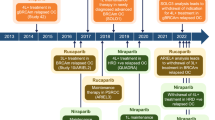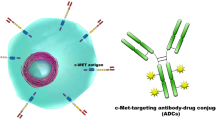Abstract
Cabozantinib (Cometriq®) is an orally administered small molecule inhibitor of multiple tyrosine kinase receptors, including those involved in the pathogenesis of medullary thyroid cancer (MTC) [i.e. rearranged during transfection (RET), MET and vascular endothelial growth factor receptor (VEGFR)-2]. Cabozantinib is indicated for the treatment of adults with progressive, unresectable locally advanced (in the EU) or metastatic (in the EU and USA) MTC. Compared with placebo, cabozantinib significantly prolonged progression-free survival, reflecting a 72 % reduction in the risk of disease progression or death, in patients with unresectable, locally advanced or metastatic MTC participating in a multinational, phase III study. A significantly higher proportion of patients receiving cabozantinib than those receiving placebo achieved an objective response or disease stabilization (i.e. a complete or partial response, or stable disease). The overall survival benefit with cabozantinib is as yet unclear, with no significant benefit observed in two interim analyses (one prespecified, and one unplanned and conducted at the request of the US FDA). The tolerability profile of oral cabozantinib is typical for a small molecule targeting the VEGFR and other tyrosine kinase-mediated pathways, with adverse events associated with the inhibition of the VEGF pathway (e.g. gastrointestinal perforation, haemorrhage, hypertension and venous thrombosis) reported in the phase III study. Treatment-emergent adverse events were generally managed with supportive therapy, dose reductions and/or dose interruptions. Although final overall survival data are awaited, current evidence suggests cabozantinib to be a valuable treatment option for adults with progressive, unresectable locally advanced or metastatic MTC.


Similar content being viewed by others
References
National Comprehensive Cancer Network. NCCN clinical practice guidelines in oncology: thyroid carcinoma. 2.2013. 2013. http://www.nccn.org/professionals/physician_gls/pdf/thyroid.pdf. Accessed 2 July 2014.
Pacini F, Castagna MG, Brilli L, et al. Thyroid cancer: ESMO clinical practice guidelines for diagnosis, treatment and follow-up. Ann Oncol. 2012;23(Suppl 7):vii110–9.
Ball DW. Medullary thyroid cancer: therapeutic targets and molecular markers. Curr Opin Oncol. 2007;19(1):18–23.
Gómez K, Varghese J, Jiménez C. Medullary thyroid carcinoma: molecular signaling pathways and emerging therapies. J Thyroid Res. 2011;2011:815826.
Schlumberger M, Bastholt L, Dralle H, et al. European Thyroid Association Guidelines for metastatic medullary thyroid cancer. Eur Thyroid J. 2012;1:5–14.
European Medicines Agency. COMETRIQ (cabozantinib): summary of product characteristics. 2014. http://www.ema.europa.eu/docs/en_GB/document_library/EPAR_-_Product_Information/human/002640/WC500163703.pdf. Accessed 2 July 2014.
Sennino B, Ishiguro-Oonuma T, Wei Y, et al. Suppression of tumor invasion and metastasis by concurrent inhibition of c-Met and VEGF signaling in pancreatic neuroendocrine tumors. Cancer Discov. 2012;2(3):270–87.
Bentzien F, Zuzow M, Heald N, et al. In vitro and in vivo activity of cabozantinib (XL184), an inhibitor of RET, MET, and VEGFR2, in a model of medullary thyroid cancer. Thyroid. 2013;23(12):1569–77.
Yakes FM, Chen J, Tan J, et al. Cabozantinib (XL184), a novel MET and VEGFR2 inhibitor, simultaneously suppresses metastasis, angiogenesis, and tumor growth. Mol Cancer Ther. 2011;10(12):2298–308.
Verbeek HH, Alves MM, de Groot J-W, et al. The effects of four different tyrosine kinase inhibitors on medullary and papillary thyroid cancer cells. J Clin Endocrinol Metab. 2011;96(6):E991–5.
Graham TJ, Box G, Tunariu N, et al. Preclinical evaluation of imaging biomarkers for prostate cancer bone metastasis and response to cabozantinib. J Natl Cancer Inst. 2014;106(4):dju033.
Nagilla M, Brown RL, Cohen EEW. Cabozantinib for the treatment of advanced medullary thyroid cancer. Adv Ther. 2012;29(11):925–34.
Kurzrock R, Sherman SI, Ball DW, et al. Activity of XL184 (cabozantinib), an oral tyrosine kinase inhibitor, in patients with medullary thyroid cancer. J Clin Oncol. 2011;29(19):2660–6.
Gordon MS, Vogelzang NJ, Schoffski P, et al. Activity of cabozantinib (XL184) in soft tissue and bone: results of a phase II randomized discontinuation trial (RDT) in patients (pts) with advanced solid tumors [abstract no. 3010]. J Clin Oncol. 2011; 29(15 Suppl. 1).
Cohen EEW, Hong DS, Pfister DG, et al. Long-term disease control of ≥2 years achieved with cabozantinib in subjects with metastatic medullary thyroid carcinoma on a phase I study [abstract no. 6090]. J Clin Oncol. 2013; 31(15 Suppl. 1).
Elisei R, Schlumberger MJ, Müller SP, et al. Cabozantinib in progressive medullary thyroid cancer. J Clin Oncol. 2013;31(29):3639–46 (plus supplementary appendix).
Brose MS, Elisei R, Schlumberger M, et al. Correlative biomarker analysis in the EXAM trial, a phase 3 study of cabozantinib (XL184) in patients (pts) with medullary thyroid carcinoma (MTC) [abstract no. 25 plus oral]. Thyroid. 2012;22(Suppl. 1):A48–9.
European Medicines Agency. COMETRIQ (cabozantinib): assessment report. 2014. http://www.ema.europa.eu/docs/en_GB/document_library/EPAR_-_Public_assessment_report/human/002640/WC500163705.pdf. Accessed 2 July 2014.
Exelixis Inc. CometriqTM (cabozantinib) capsules for oral use: prescribing information. 2012. http://www.accessdata.fda.gov/drugsatfda_docs/label/2012/203756lbl.pdf. Accessed 2 July 2014.
Sherman SI, Cohen EEW, Schoffski P, et al. Efficacy of cabozantinib (Cabo) in medullary thyroid cancer (MTC) patients with RAS or RET mutations: results from a phase III study [abstract no. 6000]. J Clin Oncol. 2013; 31(15 Suppl. 1).
US FDA. Center for Drug Evaluation and Research application number 203756Orig1s000: summary review. 2012. http://www.accessdata.fda.gov/drugsatfda_docs/nda/2012/203756Orig1s000SumR.pdf. Accessed 2 Jul 2014.
Therasse P, Arbuck SG, Eisenhauer EA, et al. New guidelines to evaluate the response to treatment in solid tumors. European Organization for Research and Treatment of Cancer, National Cancer Institute of the United States, National Cancer Institute of Canada. J Natl Cancer Inst. 2000;92(3):205–16.
Kamba T, McDonald DM. Mechanisms of adverse effects of anti-VEGF therapy for cancer. Br J Cancer. 2007;96(12):1788–95.
Chobanian AV, Bakris GL, Black HR, et al. The Seventh Report of the Joint National Committee on Prevention, Detection, Evaluation, and Treatment of High Blood Pressure: the JNC 7 report. JAMA. 2003;289(19):2560–72.
Exelixis Inc. A study of two different doses of cabozantinib (XL184) in progressive, metastatic medullary thyroid cancer [Clinical Trials.gov identifier NCT01896479]. US National Institutes of Health, ClinicalTrials.gov. 2014. http://clinicaltrials.gov/ct2/show/NCT01896479. Accessed 2 July 2014.
Disclosure
The preparation of this review was not supported by any external funding. Sheridan Hoy is a salaried employee of Adis/Springer. During the peer review process, the manufacturer of the agent under review was offered an opportunity to comment on this article. Changes resulting from comments received were made by the author on the basis of scientific and editorial merit.
Author information
Authors and Affiliations
Corresponding author
Additional information
The manuscript was reviewed by: B. Jarzab, Department of Nuclear Medicine and Endocrine Oncology, Maria Skłodowska-Curie Memorial Cancer Center and Institute of Oncology, Gliwice, Poland; C. Jiménez, Department of Endocrine Neoplasia and Hormonal Disorders, University of Texas MD Anderson Cancer Center, Houston, TX, USA; G. Pentheroudakis, Department of Medical Oncology, Ioannina University Hospital, Ioannina, Greece.
Rights and permissions
About this article
Cite this article
Hoy, S.M. Cabozantinib: A Review of Its Use in Patients with Medullary Thyroid Cancer. Drugs 74, 1435–1444 (2014). https://doi.org/10.1007/s40265-014-0265-x
Published:
Issue Date:
DOI: https://doi.org/10.1007/s40265-014-0265-x




